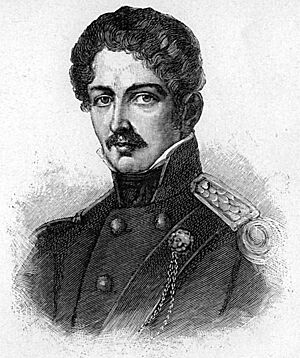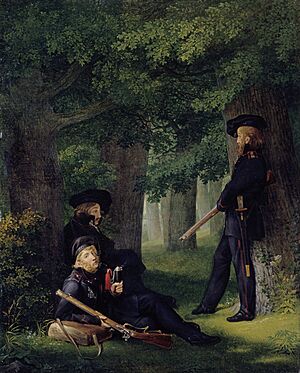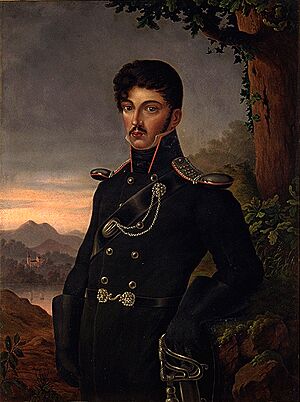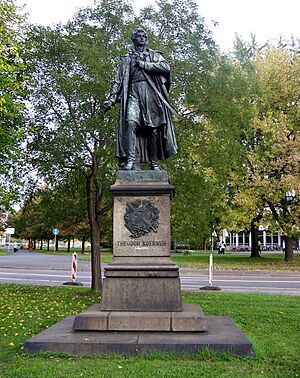Theodor Körner (author) facts for kids
Quick facts for kids
Carl Theodor Körner
|
|
|---|---|

Ludwig Adolf Wilhelm Freiherr von Lützow's adjutant 2nd Lieutenant Theodor Körner
|
|
| Born | 23 September 1791 Dresden, Saxony, Holy Roman Empire of the German Nation |
| Died | 26 August 1813 (aged 21) Forest of Rosenow near Gadebusch, Mecklenburg |
| Resting place | Wöbbelin |
| Occupation | Poet, Soldier |
| Language | German |
| Notable awards | Iron Cross (1813), 2nd Class |
Carl Theodor Körner (born September 23, 1791 – died August 26, 1813) was a talented German poet and brave soldier. He lived for a while in Vienna, where he wrote fun plays and other works for the famous Burgtheater. Later, he joined the army and became part of the Lützow Free Corps. This was a special group fighting against Napoleon during the German uprising.
During his time as a soldier, Carl Theodor Körner showed great courage. He also inspired his fellow soldiers with his strong, patriotic poems. One of his most famous poems is "Schwertlied" (meaning Sword Song). He wrote this just hours before he died. Another well-known poem is "Lützow's wilde Jagd". Both of these poems were turned into songs by famous composers like Carl Maria von Weber and Franz Schubert. People often called him the "German Tyrtaeus", comparing him to an ancient Greek poet who wrote war songs.
Contents
Early Life and Creative Beginnings
Carl Theodor Körner was born in Dresden, the capital city of Saxony. His parents were Christian Gottfried Körner and Minna Stock Körner. His aunt, the artist Dora Stock, also helped raise him in their home. He went to school at the Kreuzschule.
After finishing his education, he first chose to work in mining. But soon, he moved to Vienna, a big city known for its arts. There, he became friends with important people like Wilhelm von Humboldt, who was a Prussian ambassador, and the writer Karl Wilhelm Friedrich von Schlegel. In just fifteen months, he wrote many plays, operas, and short poems. His successful works led him to become the official poet for the court at the Vienna Burgtheater. During this time, he also got engaged to a popular actress named Antonie Adamberger. In Vienna, he met other famous artists, including Franz Grillparzer and Ludwig van Beethoven. Körner even started writing an opera story for Beethoven to compose music for, but he passed away before finishing it.
In March 1813, during the War of the Sixth Coalition, Körner left Vienna. He joined the Lützow Free Corps with his friends Friedrich Friesen and Friedrich Ludwig Jahn. This was a group of volunteer soldiers led by Ludwig Adolf Wilhelm von Lützow in Breslau, Silesia. On his way to Breslau, he saw a Prussian eagle symbol near Neustadt. This inspired him to write a poem called Der Grenzadler (meaning Border Eagle). Even while fighting, Körner kept writing poems and other works. He wrote a short opera called Der vierjährige Posten. Franz Schubert later set this to music in 1815. However, it wasn't performed until 1869 in Dresden. It was later adapted into English as The Outpost.
Fighting in the Napoleonic Wars
On March 28, 1813, Major von Lützow planned a trip to Saxony and Thuringia. Carl Theodor Körner arrived in Dresden on April 6 and visited his family. The Lützow Free Corps missed big battles at Möckern and Lützen. Major von Lützow then marched north. When he heard the French were leaving Hamburg, he turned south again. Körner really wanted to go with him. His wish came true when Lützow made him his adjutant, a special assistant.
They marched through several towns, often meeting the enemy. They gathered information, captured supplies, and took prisoners. Napoleon wanted to destroy the corps. An armistice, or temporary peace, in 1813 gave him a chance.
Major von Lützow learned about the armistice on June 4. He expected to travel safely to rejoin his soldiers. He was assured of safety by the enemy's officers. But near Kitzen in Leipzig, he found his group surrounded by a much larger force. Körner was sent to ask for an explanation. Instead of answering, the French General François Fournier-Sarlovèze hit Körner with his sword. He then ordered an attack on Lützow's cavalry. Many soldiers were hurt or captured. Major von Lützow escaped with some of his troops.
Körner was hit first and severely wounded in the head. He managed to ride his horse into a nearby forest. After helping a wounded friend, he saw enemy soldiers chasing him. He bravely shouted, "Fourth squadron,—Advance!" His trick worked. The enemy pulled back, and he could go deeper into the forest. The pain from his head wound was very bad. While hiding, he wrote a poem called "Abschied vom Leben" (meaning Farewell to Life). Here is a part of it:
Farewell to Life
(Written in the night of June 17-18, as I lay, severely wounded and helpless in a wood, expecting to die.)
"My deep wound burns;—my pale lips quake in death,—
I feel my fainting heart resign its strife,
And reaching now the limit of my life,
Lord, to thy will I yield my parting breath!
Yet many a dream hath charm'd my youthful eye;
And must life's fairy visions all depart;
Oh surely no! for all that fired my heart
To rapture here, shall live with me on high.
And that fair form that won my earliest vow,
That my young spirit prized all else above,
And now adored as freedom, now as love,
Stands in seraphic guise, before me now.
And as my fading senses fade away,
It beckons me, on high, to realms of endless day!"

During the night, he heard the enemy searching the forest. But he fell asleep and was saved in the morning by two farmers. They secretly took him to Leipzig, which was controlled by the French. Hiding any Lützow Free Corps members was strictly forbidden. He was then guided to Gnandstein Castle and later to Carlsbad in Bohemia. After that, he traveled to Berlin. Once he recovered from his wound, he rejoined the Lützow corps in Mecklenburg.
A Soldier's Final Moments
Fighting started again on August 17, 1813. Körner spent the night of August 25 at Gottesgabe manor. He played the piano and sang songs there. Early the next morning, a battle happened in the nearby forest of Rosenow, near Gadebusch. Körner was pursuing a group of enemy soldiers. Riflemen hiding in the bushes fired many shots at their pursuers. One of these shots hit Körner in his stomach. The wound was severe, affecting his liver and spine. He immediately lost his ability to speak and his consciousness. He was carried to a nearby wood, but he could not be saved.
Carl Theodor Körner was buried under an oak tree in the village of Wöbbelin. This is about 8.5 kilometers from Ludwigslust. A tomb has since been placed over his grave, surrounded by a wall. Körner died at the young age of twenty-one. His father later collected and published his poems in 1815.
Carl Theodor Körner had a very close bond with his sister, Emma Körner. When he died, she lived just long enough to finish his portrait. She also drew a sketch of his final resting place. Emma Körner actually lived two years longer than her brother. She died of a fever in Dresden after visiting his grave. She was buried next to him in Wöbbelin.
Körner's Published Works
Carl Theodor Körner's first book of poems was called Knospen (meaning Buds), published in 1810.
Some of his popular comedies include Die Braut (The Bride, 1812) and Der grüne Domino (The Green Domino, 1812). These were very successful. Der Nachtwächter (The Night Watchman, 1812) was also notable, as was his famous Sword Song. His historical tragedy, Zriny, is considered one of his most important works.
Many of the poems he wrote during his time with the Lützow Free Corps were set to music. Composers like Carl Maria von Weber and Franz Schubert used his words for their songs.
His father put together a collection of his battle songs. This book was published in Berlin in 1814 under the title Leyer und Schwerdt (modern German Leier und Schwert, meaning Lyre and Sword). His complete works were later published by his mother's direction. The Italian poet and novelist Alessandro Manzoni even dedicated his ode "Marzo 1821" to Theodor Körner.
 | Ernest Everett Just |
 | Mary Jackson |
 | Emmett Chappelle |
 | Marie Maynard Daly |



